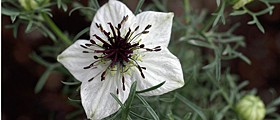
Information on Ashwagandha
Ashwagandha is a certain plant from the family ofnightshades, which is botanically referred to as solanaceae. Ahwagandha itself bears the botanical name ofhania somnifera and it is frequently used in the traditional Indian medicinecalled Ayurveda. Other commonly used names for ashwagandha include samm alferakh, amukkara in tamil, kanaje hindi, ajagandha, winter cherry and Indianginseng. Ashwagandha is actually a shorttype of shrub which can grow up to 75 cm in height. It has one main centralstem out of which all the branches tend to extend in a radial manner in orderto form a star pattern which is botanically referred to as stellate. It iscovered with a dense network of wooly hairs which are scientifically referredto as tomentose. Ashwagandha is also characterized by small, green flowers andthe fruit which has on orange color when ripe. Ripe ashwagandha fruits are alsoknown for their characteristic milk coagulating properties. The roots of theplant are brown, long and tuberous and are used for a vast array of differenttypes of medicinal purposes. The plant originates from the dry regions ofIndia.
Medicinal Use
The traditional Indian medicine Ayurveda uses the roots ofthe plant to prepare the medicinal Ashwagandha. Ayurveda specialists claim thatashwagandha has very potent life prolonging, rejuvenative, sedative and evenaphrodisiac properties. Ayurveda traditionally uses the medicinal ashwagandhafor the prevention and treatment of a large number of medical conditions suchas spermatorrhoea, different types of neurodegenerative disorders, memory loss,nervous exhaustion, rheumatism, senility, constipation, debility, emaciation,premature aging, impotency, abnormal thirst, loose tooth, muscle tension,muscle weakness, bone weakness, dehydration and chronic fatigue. The fruits ofashwagandha can also be used as a substitute for the coagulation of milk in theprocess of cheese making. The leaves and fruits of ashwagandha may also come invery handy when used topically for the treatment of ulcers, carbuncles,tubercular glands and different types of tumors. Various scientific studieshave shown that ashwagandha may be used very efficiently for the treatment ofpainful sensations caused by arthritis, anxiety and various drug withdrawalsymptoms.
Additional Information
Some sources claim that ashwagandha root in its supplementalform can be used very efficiently for the treatment of various infectiousdisease, fever and swelling. The same sources claim that it may also come invery handy for all those who suffer from Alzheimer’s disease and a weakenedimmune system.

















Your thoughts on this
Loading...